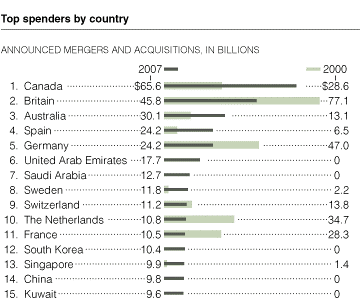For much of the world, the United States is now on sale at discount prices. With credit tight, unemployment growing and worries mounting about a potential recession, American business and government leaders are courting foreign money to keep the economy growing. Foreign investors are buying aggressively, taking advantage of American duress and a weak dollar to snap up what many see as bargains, while making inroads to the world’s largest market.
Last year, foreign investors poured a record $414 billion into securing stakes in American companies, factories and other properties through private deals and purchases of publicly traded stock, according to Thomson Financial, a research firm. That was up 90 percent from the previous year and more than double the average for the last decade. It amounted to more than one-fourth of all announced deals for the year, Thomson said.
While there are benefits from this trend with Toyota currently building a large manufacturing plant near Tupelo, Mississippi and a German company investing $3.7 billion on a stainless steel plant in Alabama, not everyone hails this development as the best thing for America.
Some labor unions see the acceleration of foreign takeovers as the latest indignity wrought by globalization.
“It’s the culmination of a series of fool’s errands,” said Leo W. Gerard, international president of the United Steelworkers. “We’ve hollowed out our industrial base and run up this massive trade deficit, and now the countries that have built the deficits are coming back to buy up our assets. It’s like spitting in your face.”
So, can we expect Americans to start plastering their SUVs with Thank God for Canada stickers?
Debate is swirling in Washington about the best way to stimulate a flagging economy. Despite divided opinion about the merits, foreign investment may be preventing deeper troubles by infusing hard-luck companies with cash and keeping some in business.
The most conspicuous beneficiaries are Wall Street banks like Merrill Lynch, Citigroup and Morgan Stanley, which have sold stakes to government-controlled funds in Asia and the Middle East to compensate for calamitous losses on mortgage markets. Beneath the headlines, a more profound shift is under way: Foreign entities last year captured stakes in American companies in businesses as diverse as real estate, steel-making, energy and baby food.
[...]
“The forces sucking in this capital are much bigger than the political forces,” said Mr. Garten, the Yale trade expert. “If there is a big controversy, it will be between Washington on the one hand and corporate America on the other. In that contest, the financiers and the businessmen are going to win, as they always do.”
That is a fact and may well be the quote of the day.


No comments:
Post a Comment